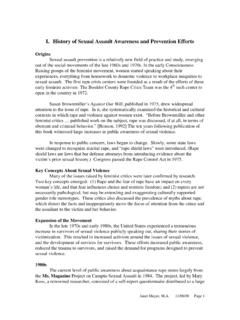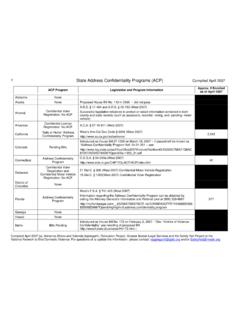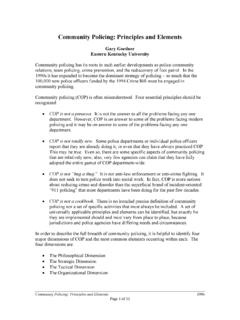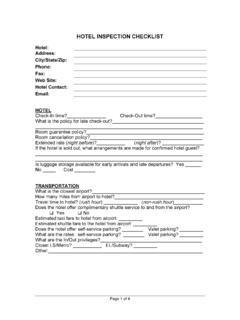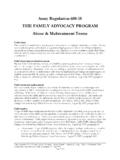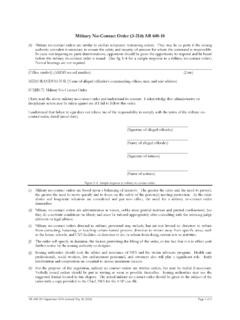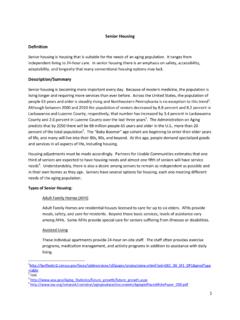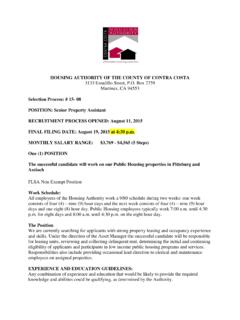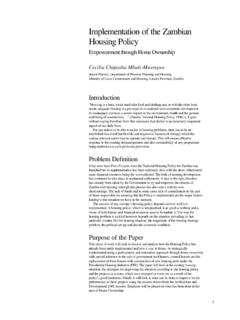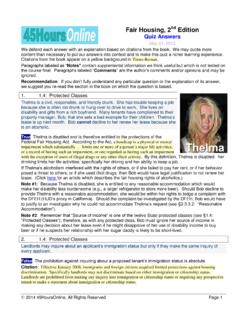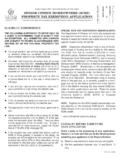Transcription of The Americans with Disabilities Act, the Fair Housing Act ...
1 November 2009 Page 1 of 5 The Americans with Disabilities Act, the Fair Housing Act, and the Rehabilitation Act of 1973, as amended, ALL apply to domestic violence shelters. The Fair Housing Act (FHA) does not use the term service animal the Americans with Disabilities Act (ADA) does. For an animal to be admitted under the ADA, where there is a no animals allowed policy in effect, the animal must be a service animal. If it is, then the business (or state or local government program or service) must make a reasonable modification of policy and allow the animal in. For it to be a service animal, it must be individually trained to perform specific tasks to assist the person with their disability (alerting a deaf person to sounds, helping a person with a mobility disability with balance, or picking things up, guiding a person with a visual disability, etc.). The person with the disability may be asked if they have a disability, and if their animal is a service animal that s it.
2 No documentation of the disability can be required, and no proof of training can be required, even if state law has this requirement. If the animal engages in disruptive behavior that causes a fundamental alteration of the business or program, the dog may be removed, but the individual must be given an opportunity to stay. Otherwise, the animal may accompany the individual with the disability in all public areas of the facility. Under the Fair Housing Act, the rules, and the language, are different. Under the Fair Housing Act, the animal need not be individually trained to do anything. It need not be a service animal. Under the Fair Housing Act, the term reasonable policy modifications is not used rather, the term reasonable accommodations is used. Discrimination under the FHA includes "a refusal to make reasonable accommodations in rules, policies, practices, or services, when such accommodations may be necessary to afford [a November 2009 Page 2 of 5 person with a disability] an equal opportunity to use and enjoy a dwelling.
3 " 42 3604(f)(3)(B). See Where the ADA anticipates a brief interaction between a store and a customer, and therefore prohibits intrusive questioning, the FHA contemplates a longer relationship, and like the employment provisions of the ADA, allows the Housing provider to ask for more information about the disability (but still does not allow for disclosure of medical documentation): The request should state that the tenant has a disability and explain how the requested accommodation will be helpful. In addition, the tenant should include a note from his or her service provider, such as a doctor or therapist, verifying the need for the support animal (see sample letter, below, as an example). Note that the tenant need not disclose the details of the disability, nor provide a detailed medical history. So long as the requested accommodation does not constitute an undue financial or administrative burden for the landlord, or fundamentally alter the nature of the Housing , the landlord must provide the accommodation.
4 The individual seeking a reasonable accommodation under the Fair Housing Act must demonstrate a relationship between his or her ability to function and the companionship of the animal. Under the Fair Housing Act, the individual with the disability needs to show that allowing the animal to accompany them allows them an equal opportunity to use and enjoy his or her dwelling ; and that the reasonable accommodation would not constitute an undue burden or fundamental alteration. November 2009 Page 3 of 5 So, if the animal is individually trained to perform tasks to assist the individual with a disability, it is a service animal under the ADA, and it must be allowed to accompany the individual. The service animal s owner cannot be required to provide documentation of the nature of the disability, and no proof of training and no certification may be required. If, however, the animal is not individually trained to perform tasks to assist the individual with the disability, it is not a service animal, and the domestic violence shelter does not have an ADA obligation to allow the animal to accompany the individual with a disability.
5 The shelter does have a separate obligation, however, under the Fair Housing Act, even if the animal has no training at all, to determine whether allowing the animal to accompany the individual would provide her with an equal opportunity to use and enjoy a dwelling (the shelter). Emotional support animals, for example, may not receive any training at all to perform tasks to assist the individual with a disability, but the shelter would nevertheless have to admit the animal under the Fair Housing Act as a reasonable accommodation, if it can be shown that allowing the animal to accompany the individual would provide her with an equal opportunity to use and enjoy a dwelling (the shelter). In that case, the shelter would be entitled to ask for a doctor s note that reflected that there was a medical need for the animal. A sample letter would state: Dear [ Housing Authority/Landlord]: [Full Name of Tenant] is my patient, and has been under my care since [date].
6 I am intimately familiar with his/her history and with the functional limitations imposed by his/her disability. He/She meets the definition of disability under the Americans with Disabilities Act, the Fair Housing Act, and the Rehabilitation Act of 1973. Due to mental illness, [first name] has certain limitations regarding [social interaction/coping with stress/anxiety, etc.]. In order to help alleviate these difficulties, and to enhance his/her ability to live independently and to fully use and enjoy the November 2009 Page 4 of 5 dwelling unit you own and/or administer, I am prescribing an emotional support animal that will assist [first name] in coping with his/her disability. I am familiar with the voluminous professional literature concerning the therapeutic benefits of assistance animals for people with Disabilities such as that experienced by [first name]. Upon request, I will share citations to relevant studies, and would be happy to answer other questions you may have concerning my recommendation that [Full Name of Tenant] have an emotional support animal.
7 Should you have additional questions, please do not hesitate to contact me. Sincerely, Name of Professional and Signature (Source of letter: ) My Conclusion 1. Determine if the animal the individual wants to bring into shelter is a service animal or not. You may ask Is that a service animal? and, What service does the animal perform? You may not ask the person to make the animal demonstrate the service, and you may not ask what the person s disability is. See 2. If you determine that it is a service animal, make a reasonable modification of policy under the ADA, and let them in, without further inquiry or documentation. 3. If they tell you that it is not a service animal (that it is not individually trained to perform tasks to assist them with their disability), or you independently make this determination, then consider your obligations under the Fair Housing Act. Determine November 2009 Page 5 of 5 whether they have a letter from a health care professional stating that they need to be accompanied by the animal in order to enhance his/her ability to live independently and to fully use and enjoy the dwelling.
8 If they do, make a reasonable accommodation under the Fair Housing Act, and let them in. Marc Dubin, Esq. Former Senior Trial Attorney Department of Justice Civil Rights Division Disability Rights Section\1992 2005
